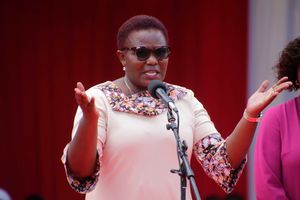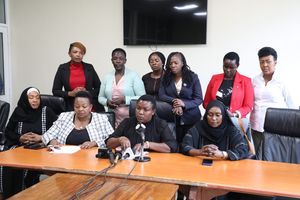
Back row: Governors Cecily Mbarire (Embu), Anne Waiguru (Kirinyaga), Fatuma Mohamed Achani (Kwale) and Gladys Wanga (Homa Bay). Front row from left: Wavinya Ndeti (Machakos), Susan Kihika (Nakuru) and impeached Kawira Mwangaza (Meru).
Female governors are facing mounting challenges with increasing cases of targeted attacks, intimidation and impeachment threats.
Despite their historic rise to leadership positions — with seven women being elected as governors in the August 2022 General Election — they are encountering opposition from male-dominated political structures.
Allegations of mismanagement, absenteeism, and well-orchestrated smear campaigns have become common, pointing to a broader struggle for women in high office to assert their leadership.
Some female governors have reported cases of interference from powerful political figures, including Members of Parliament, senators and even national government officials who want to control county affairs.
Impeached Meru Governor Kawira Mwangaza recently broke her silence and accused government machinery of orchestrating her ouster.
She said that the bitterness of her opponents, particularly male leaders, stemmed from their defeat at the ballot in 2022. Ms Mwangaza beat prominent figures such as former Agriculture Cabinet Secretary Mithika Linturi and former Governor Kiraitu Murungi.
“My removal was not a reflection of the people's will but rather a calculated move by my competitors and the national government who sought to punish me for refusing to be manipulated politically,” the former governor claimed.
Nakuru Governor Susan Kihika, who is on maternity leave in the United States of America, continues to face a barrage of criticism and recall threats.

Susan Kihika, Governor, Nakuru County.
Some women leaders earlier in the week came to her defence amid growing public criticism over her conspicuous absence from the county's affairs in recent months.
Despite the governor stating that she was on maternity leave and would resume her responsibilities in the coming weeks, Nakuru residents filed a petition at the county assembly demanding accountability from her.
In a press briefing on Tuesday, nominated senators Tabitha Mutinda, Hamida Kibwana, and Veronica Maina; Woman Representatives Cynthia Muge, and Betty Maina, as well as former Nominated Senator Millicent Omanga appealed to the public to exercise patience, saying that women navigate a tough balancing act between work and family.
“As women leaders of Kenya, we stand here today in solidarity with Governor Susan Kihika, a dedicated public servant and a mother who has recently welcomed twins into the world. We congratulate her on the birth of her children. They are a blessing from God, and we give thanks,” stated the leaders in a joint statement.
“First and foremost, we wish to remind the public that childbirth is a natural, unique, and deeply personal process. As women leaders, we recognise the unique challenges that come with balancing public service and family responsibilities. The journey to motherhood brings immense joy, but can also come with unforeseen medical complications requiring time for recovery and healing. Many women have gone through this, and Governor Kihika is no different.”
Homa Bay Governor Gladys Wanga has faced battles of her own from her critics, particularly on social media.

Homa Bay Governor Gladys Wanga. She is the new ODM chairperson.
The governor, who was recently elevated to national chairperson in veteran opposition leader Raila Odinga’s Orange Democratic Movement (ODM) party has, however, maintained that she remains focused on her duties and would not be distracted by her opponents.
“Let us stop propaganda. Fortunately, I’m battle-hardened, focused, and undeterred,” Ms Wanga charged in the wake of a social media slur targeting her.
On Friday, Kirinyaga Governor Anne Waiguru and her Kwale counterpart, Fatuma Achani, said that whereas women in leadership continue to face such challenges, they only make them stronger in their roles.
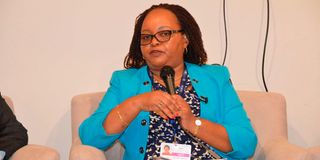
Kirinyaga Governor Anne Waiguru.
“These actions and or reactions are a reflection of the challenges that women in leadership routinely go through. It’s a reflection of the kind of society we are. We place higher and often unreasonable standards on women leaders,” she told Sunday Nation.
Ms Waiguru said that “harassment, bullying and hostility is common,” but added that leadership is about dealing with expected and unexpected challenges.
“While it is often frustrating it does not deter us but instead gives us stronger determination to succeed. So G7 is here not just to stay but to thrive,” she said, referring to the Council of Governors (CoG) women caucus whose patron is Mr Odinga’s wife, Ida.
Governor Achani told Sunday Nation that women who join politics are generally “battle-hardened” and remain focused on serving the electorate.
“When you are a female politician, you are bound to receive a backlash, especially from male chauvinists. This cannot break us but only makes us stronger,” Ms Achani said.
“The occurrence in Meru (Mwangaza’s ouster) is unfortunate, as it turned out to be a battle of all against one. For Wanga, she is a strong leader who broke the record in the Nyanza region by becoming the first woman governor and cannot be disturbed by such smear campaigns targeting her. As women leaders, we know such attacks are bound to happen, but we remain focused on service delivery.”
In Machakos, Governor Wavinya Ndeti is not sitting pretty after Muthwani Ward Member of County Assembly (MCA) Dominic Maitha vowed to table an impeachment motion against her.
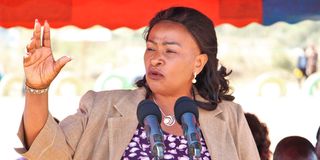
Machakos Governor Wavinya Ndeti.
When reached for comment, Ms Ndeti admitted to Sunday Nation that indeed women governors are under siege from what she termed as male chauvinistic quarters.
“Oh yes, the agenda on women in leadership is a big threat from male chauvinistic quarters. The space of women leadership should be guarded at all costs,” she told Sunday Nation.
Crispin Afifu, a gender specialist at the International Center for Research on Women (ICRW) told Sunday Nation that women governors appear to be under siege, adding that the growing trend of impeachment threats against them cannot be dismissed as mere coincidence.
Mr Afifu said cases involving Ms Mwangaza’s removal and the persistent threats against governors Ndeti and Kihika point to a political environment that remains deeply resistant to female leadership.
He noted that their assertiveness and independence are frequently mischaracterised as arrogance or incompetence—traits often tolerated or even celebrated in their male counterparts.
“These impeachment efforts reflect more than just performance issues; they are manifestations of a broader discomfort with shifting gender norms in leadership. The pattern of impeachment motions targeting women governors raises troubling questions about the gendered dynamics of political power and governance,” Mr Afifu said in an interview.
He added that while accountability is essential in leadership, the disproportionate scrutiny faced by women leaders like Mwangaza, and the looming threats against Wavinya Ndeti and Kihika, suggest a deeper systemic bias.
Impeachment threat
If not facing an impeachment threat, women governors seem to be facing a myriad of issues.
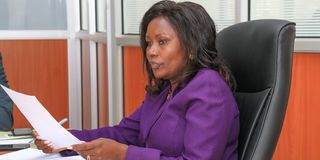
Embu Governor Cecily Mbarire.
Embu Governor Cecily Mbarire, though not facing any threat of impeachment, could be facing a dilemma due to the changing political dynamics in the Mt Kenya region.
The governor, who was elected on a UDA party ticket, could be torn between sticking with a party that pundits say has lost ground in the region or jumping ship to the camp led by impeached Deputy President Rigathi Gachagua, said to be enjoying support on the ground.
In some counties, the friction has escalated into public confrontations, with accusations that some leaders are using State institutions to frustrate female-led administrations.
Beyond political opposition, societal biases continue to pose an additional hurdle for female governors.
Many are subjected to scrutiny that their male counterparts rarely face, with their leadership often questioned based on gender rather than performance.
The heightened resistance reflects a deeper struggle for gender inclusivity in governance, emphasising the need for institutional reforms and stronger protections to ensure that women in leadership can effectively execute their mandates without undue interference.


